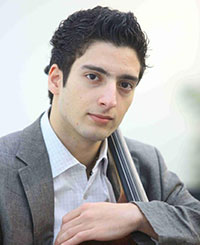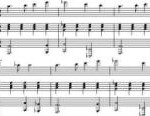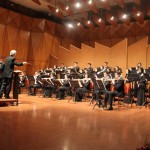
Payam Taghadossi (born in 1989) started his musical education at the age of 4 years with Monika Scherbaum in Bregenz (Austria). At the Conservatory Feldkirch he joined the class of Imke Frank and Martin Merker. Later he studied in Zurich (Switzerland) with Thomas Grossenbacher and Christian Proske, where he 2011 graduated as a Bachelor of Arts in Music Performance. Two years later as the student of Rafael Rosenfeld he received his Master of Arts in Music Performance diploma and later graduated as a Master of Arts in spezialized Music Performance in 2016 from the Hochschule für Musik Basel FHNW.
 Watch Payam playing cello at the age of 18.
Watch Payam playing cello at the age of 18.
The cellist won several awards. (e. g. 1st prize and a special award at the competition of the International Fajr Music Festival (2008), the 2nd Prize at the International Karl Davidov Cello Competition in Latvia. Furthermore he is a 5 times winner of the 1st prize at the austrian national Prima La Musica Competition).
As a soloist he has performed Tschaikovsky`s Rokoko Variations with the Basel Symphony Orchestra in Switzerland, the Schumann Cello and Brahms Double Concerto with the Orchestra of Albstadt in Germany, the Haydn C-Major Cello Concerto with the Ensemble Viatores in Austria, the Beethoven Tripel Concerto with the Orchestra Liechtenstein-Werdenberg and Tschaikovky`s Pezzo Capriccioso with the Philharmonie Budweis.
He received further impetus by attending masterclasses of David Geringas, Ivan Monighetti, Frans Helmerson, Wolfgang Boettcher, Miklos Perenyi, Reinhard Latzko, Jens-Peter Maintz, Wolfgang Emmanuel Schmidt, Valter Despalj and Wenn-Sinn Yang. He received scholarships by the Meadow Mount School of Music (New York), the P.E. Förderkreis (Mannheim, Germany) and the International Richard Wagner Association.
One focus of his musical activities is chamber music. In 2009 he founded, together with Romaine Bolinger and Alexander Boeschoten, the piano trio “Gagliano Trio”. The Trio gave it`s debut in 2009 at the Zurich University of Arts. During its studies the ensemble was decisively influenced by Stephan Goerner (Carmina Quartet), Benjamin Engeli (Tecchler Trio), Eckart Heiligers (Trio Jean Paul), Rafael Rosenfeld (Merel Quartet), Zakhar Bron, Thomas Grossenbacher und Prof. Homero Francesch. The Trio has already been a guest at international concert venues and festivals (e. g. Schubertiade Hohenems (Austria), Kammermusik Basel, Rüttihubeliade). Their repertoire draws a line from the works of the classical period, via the Romantic idea of „poetic music“ to the music of today. Several concerts were recorded by the Austrian Broadcasting Corporation (ORF). Recently the ensemble triumphed at the chamber music competition of the August Pickart foundation. By naming their ensemble Gagliano Trio, the three musicians refer to the neapolitan luthier family, who wrote music history by making stringed instruments in the 18th and 19th century. The violinst Romaine Bolinger plays on an instrument made by Ferdinando Gagliano and Payam Taghadossi plays a cello made by Lorenzo Ventapane, who was a pupil of Nicolo Gagliano.
Payam Taghadossi collected essential orchestral experience as an intern and later substitude at the Zurich Tonhalle Orchestra and as principal cellist with the Basel Sinfonietta, Bron Chamber Orchestra and the Symphony Orchestra of Liechtenstein before the Basel Symphony Orchestra hired him in 2014. He appeared as a soloist and in various chamber ensembles from North America, Europe and the Middle East, to South Korea and Japan. He currently plays a Lorenzo Ventapane cello from the year 1820.









